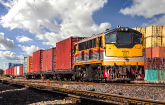Greenbrier and Watco announce railcar repair joint venture GBW Railcar Services
~ Creates largest independent railcar repair network of 38 locations across North America, including 14 certified tank car shops
~~ Meets surging demand for tank car recertification, retrofit and repair
~~ Jim Cowan, industry veteran and recent Greenbrier hire, to lead joint venture
LAKE OSWEGO, Ore. and PITTSBURG, Kan., June 4, 2014 /PRNewswire/ -- The Greenbrier Companies, Inc. (NYSE:GBX) and Watco Companies, LLC today announced a new company that will create a world-class network of railcar repair shops. The 50/50 joint venture forms GBW Railcar Services, LLC (GBW), which will own and operate Greenbrier's and Watco's respective railcar repair, refurbishment and maintenance businesses.
GBW will have the scale to meet the certification and maintenance requirements of the growing North American tank car fleet and expand railcar repair service offerings for general freight cars of nearly all types. With current combined annual revenue of approximately $325 million and a geographically diverse network of 38 facilities located across North America, GBW will employ more than 2,100 team members. GBW will be one of the largest independent railcar repair shop networks in North America ranked by number of locations and geographic diversity. GBW will be led by recent Greenbrier hire, Jim Cowan, as CEO.
Greenbrier now operates 23 locations and Watco currently operates 15 complementary sites. GBW's combined network will feature 14 tank car repair shops – 10 of which will be from Watco and four from Greenbrier – all certified by the Association of American Railroads as required by federal regulations. Additionally, all 38 locations can perform the type of general freight car repair and maintenance services that are consistently in demand and which are a core competency of both Greenbrier and Watco.
This joint venture blends complementary business expertise from each company allowing GBW to become one of the few repair shop networks able to service almost the entire range of railcar types in the North American fleet. Greenbrier and Watco bring vast relationships throughout the rail industry. Greenbrier provides commercial strength and leadership in railcar safety design and engineering, including its recently developed "Tank Car of the Future." Greenbrier also contributes its geographically dispersed railcar repair, refurbishment and maintenance network. Combined with the experience derived from its integrated business model including manufacturing, leasing and railcar management services, Greenbrier's leadership in the rail industry will be a strong contribution to GBW.
Watco brings to GBW some of the broadest tank car expertise available in the market along with substantial general railcar repair capability through a well-established and efficient railcar repair platform. In addition to its repair operations, Watco has a broad Customer base and operating footprint as one of North America's largest short line railroad, port and terminal management companies. Watco contributes a broad range of repair services to GBW. Watco's multiple tank car repair facilities in the Midwest, Gulf and southeastern U.S., a fast growing region for petrochemical businesses, will further position GBW for success. Watco, along with its partner Kinder Morgan, is a leading provider of transportation and terminal services to major Gulf ports for energy businesses serving the Bakken formation and other energy fields.
In addition to Jim Cowan's role leading GBW, he will continue to serve as Senior Vice President, Operations for Greenbrier and maintain certain responsibilities at Greenbrier unrelated to GBW. Cowan is well known in the railcar industry with years of experience in senior leadership positions and extensive tank car experience. Most recently, he worked for Amsted Rail Group on assignment in Brazil, and served as President and Chief Executive Officer of American Railcar Industries, Inc. His total tenure at ARI was approximately eight years. Cowan is respected for his ability to enhance gross margin performance at the organizations he has led. GBW will be governed by a Board of Directors which will consist of four members – two appointed by Greenbrier and two appointed by Watco.
William A. Furman, Chairman and CEO of Greenbrier said, "This combination establishes GBW as a clear leader in the business of making tank cars safer at any speed. Demand for tank car retrofit services from our Customers to address the growing need for safe rail transport solutions has become robust. Greenbrier's and Watco's shared approach to tank car safety advances both public safety and environmental protection, and strengthens the North American tank car fleet. Working together, we will drive improvements in public safety while preserving the economic benefits of crude by rail and the North American energy renaissance. Jim Cowan's operations expertise, particularly his recognized ability to expand gross margins and increase return on invested capital, is the key ingredient that will allow GBW to achieve its full potential."
Watco CEO Rick Webb said, "The combination of our repair businesses creates additional opportunities to serve the Customers of both companies. GBW will utilize Greenbrier's and Watco's strengths to find new and better ways to offer railcar services to our Customers in a manner that creates value for them and for GBW. Together these combined attributes will make GBW stronger than the sum of its individual parts. Moreover, we are thrilled that Jim Cowan, with his unique skills, will lead GBW."
"During the past three years Watco has heavily invested in our team members and facilities to meet the demand we knew was coming in North America. We look forward to working with Greenbrier to further expand our service offerings to meet the needs of our Customers," Webb continued. "This joint venture is a testament to the vision my father had when he created Watco more than 30 years ago. His vision was to create a company that could meet the needs of our Customers on a daily basis. We will now be able to do this all over North America. This is his vision and this will benefit our Customers. For that, I am very grateful."
Jim Cowan, incoming CEO of GBW said, "Our new company formed by two industry leaders will respond directly to interests expressed by our existing Customers. The formation of GBW will create timely capacity to service and retrofit North America's tank car fleet, and offer a range of repair and maintenance services for other general freight cars on a reliable and consistent basis."
"From the very first day of GBW operations, we will require that safety, quality and Customer service remain the core values of this new company," Cowan added. "Maintaining this focus ensures our team members remain safe and that we are successful in the long run as we grow the business by meeting the needs of our Customers. I want our team members to know that GBW is focused on safety, quality and growth so they are confident their future is secure when together we meet the needs of our Customers."
Tank Car Repair Wave Led By Recertification Requirements
GBW will capitalize on the heightened demand for federally-mandated tank car recertification that requires every tank car in North America to undergo a battery of inspection requirements at least once every 10 years in order to continue in operation. Known tank car recertification requirements for the current fleet are 22,000 tank cars per year. Recertification is expected to increase by 25 percent from current levels through 2015 and will steadily accelerate year over year to 2018 when more than 49,000 tank car recertifications are expected to be required. It is also well known that the U.S. Department of Transportation (DOT) will soon promulgate new tank car design standards, likely accompanied by related retrofit requirements for the existing North American tank car fleet in order to permit continued flammable liquids service for these tank cars. It is possible over time that other tank cars used in non-flammable hazardous service will also be subject to regulations requiring a more robust design. Canadian regulators took initial action on tank car standards in April and the Canadian government's ongoing regulatory process related to tank car safety is advancing.
The North American tank car fleet as of November 2013 included 272,100 DOT-111 tank cars of which 255,000 were of the older legacy design. Among those tank cars, more than 170,000 were in hazardous transport, with 68,000 of those tank cars in crude oil and ethanol service. North American railroads are championing a substantial safety initiative related to the transport of crude by rail that includes meaningful operating changes. Tank car design and retrofits are also an important component of the safety equation. GBW will lead by bringing necessary repair, maintenance and retrofit capacity online at a critical time.
GBW is designed to deliver on Greenbrier's previously announced retrofit designs for the legacy DOT-111 tank cars that include high-flow pressure relief valves, head shields, top fittings protection, thermal protection and shell jackets with thicker metal for tank car exteriors. Appropriate retrofit choices could allow extended service for DOT-111 tank cars in some hazardous materials service as these cars are placed in lower risk service over time. GBW will also offer retrofit alternatives for the most recently built CPC-1232 tank cars, with features that will reduce the likelihood of tank cars releasing contents in derailments. Combined, these retrofits can meaningfully improve the safety performance of all tank car types in continued service.
GBW plans expansion across a range of tank car services including expanding the number of its shops that offer tank car lining services. Many of the tank car certified shops in the GBW network offer tank car lining solutions. Tank car linings protect the interior of the tank car from the corrosive content of certain commodities including some types of crude oil.
Closing of the new joint venture is subject to customary conditions, including the negotiation and execution of definitive transaction documents, receipt of all necessary approvals and other conditions. Subject to the completion of all required documents and the fulfillment of all conditions, the closing is currently expected to occur during the third calendar quarter of 2014.
Conference Call
Greenbrier and Watco will host a teleconference to discuss the GBW Railcar Services joint venture. Teleconference details are as follows:
- June 4, 2014
- 8:00 a.m. Pacific Daylight Time
- Phone: 1-630-395-0143, Password: "Greenbrier"
- Real-time Audio Access: ("Newsroom" at http://www.gbrx.com)
Please access the site 10 minutes prior to the start time. Following the call, a webcast replay will be available for 30 days. Telephone replay will be available through June 21, 2014, at 1-402-530-7999.
About Greenbrier
Greenbrier, (www.gbrx.com), headquartered in Lake Oswego, Oregon, is a leading supplier of transportation equipment and services to the railroad industry. Greenbrier builds new railroad freight cars in its four manufacturing facilities in the U.S. and Mexico and marine barges at its U.S. facility. It also repairs and refurbishes freight cars and provides wheels and railcar parts at 37 locations across North America. Greenbrier builds new railroad freight cars and refurbishes freight cars for the European market through both its operations in Poland and various subcontractor facilities throughout Europe. Greenbrier owns approximately 8,800 railcars, and performs management services for approximately 234,000 railcars.
About Watco
Watco Companies, LLC, is a Pittsburg, Kansas, based transportation company providing mechanical, transportation, and terminal and port services solutions for Customers throughout North America and Australia. Watco's Mechanical Services division operates 15 railcar repair shops, 23 railroad repair shops, 8 locomotive shops and 4 private railcar shops. Watco is the owner of Watco Transportation Services, LLC, one of the largest short line railroad holding companies in the U.S. with 30 short line railroads operating on more than 4,400 miles of track, as well as 28 industrial contract switching locations. The Terminal and Port Services division currently manages 25 terminals, 9 warehouses and 2 port locations. More information about Watco and its subsidiaries can be found at www.watcocompanies.com.
Safe Harbor Statement
SAFE HARBOR STATEMENT UNDER THE PRIVATE SECURITIES LITIGATION REFORM ACT OF 1995: This press release may contain forward-looking statements, including, but not limited to, statements regarding intention of the parties to form the joint venture and its expected operations, scale, service offerings, and opportunities, GBW's role in the industry and the intention of the parties to drive improvements in public safety, expected customer demand for the joint venture's products and services, GBW's plans to expand tank car repair, lining and retrofit capacity and expected regulatory requirements concerning the tank car industry and any other statements not about historical facts. The parties use words such as "anticipates," "believes," "forecast," "potential," "goal," "contemplates," "expects," "intends," "plans," "projects," "hopes," "seeks," "estimates," "strategy," "could," "would," "should," "likely," "will," "may," "can," "designed to," "future," "foreseeable future" and similar expressions to identify forward-looking statements. These forward-looking statements are not guarantees of future performance and are subject to certain risks and uncertainties that could cause actual results to differ materially from in the results contemplated by the forward-looking statements. Factors that might cause such a difference include, but are not limited to, the fact that the parties may not be successful in their efforts to complete the negotiation and execution of definitive documents for the creation of GBW and the related transactions and the expected formation of the joint venture may not be completed due to numerous factors, including factors outside the control of Greenbrier and Watco or the non-fulfillment of closing conditions; the completion of the formation of the joint venture may not take place within the time frame expected by the parties (or at all); regulatory and other approvals or consents needed for the joint venture may not be granted or may be granted only with restrictive conditions or after delays; integration of the joint venture's various operations may not occur smoothly or efficiently or on a timely basis; the joint venture may experience difficulties with labor relations or other aspects of coordinating operations; the joint venture may not be able to capitalize on perceived opportunities and may be negatively impacted by competition from other companies; turmoil in the credit markets and financial services industry; high levels of indebtedness and compliance with the terms of indebtedness; write-downs of goodwill, intangibles and other assets in future periods; the joint venture may not have sufficient availability of borrowing capacity or other sources of funds; fluctuations in demand for railcar repair services or GBW's failure to obtain work from customers as anticipated; loss of one or more significant customers; customer payment defaults or related issues; actual future costs and the availability of materials and a trained workforce; failure by the joint venture to achieve or maintain certification for its repair shops; steel or specialty component price fluctuations and availability and scrap surcharges; changes in product mix; labor disputes, energy shortages or operating difficulties that might disrupt the joint venture's operations; production difficulties and product delivery delays; the non-performance of the joint ventures members, alliance partners, subcontractors or suppliers; integration of current or future acquisitions; succession planning; discovery of defects in services resulting in increased warranty costs or litigation; physical damage or product or service liability claims that exceed GBW's insurance coverage; train derailments or other accidents or claims that could subject GBW to legal claims; actions by various regulatory agencies including potential environmental remediation obligations or changing tank car or other rail car regulation; and interruption of GBW's manufacturing operations as a result of lease termination or expiration; and such other risks may be discussed in more detail under the headings "Risk Factors" and "Forward Looking Statements" in Greenbrier's Annual Report on Form 10-K for the fiscal year ended August 31, 2013, and its other reports on file with the Securities and Exchange Commission and which are applicable to the joint venture and the provision of railcar repair services. Readers are cautioned not to place undue reliance on these forward-looking statements, which reflect management's opinions only as of the date hereof. Except as otherwise required by law, Greenbrier and Watco do not assume any obligation to update any forward-looking statements.
SOURCE The Greenbrier Companies, Inc. (GBX)
WANT YOUR COMPANY'S NEWS FEATURED ON PRNEWSWIRE.COM?
Newsrooms &
Influencers
Digital Media
Outlets
Journalists
Opted In





Share this article